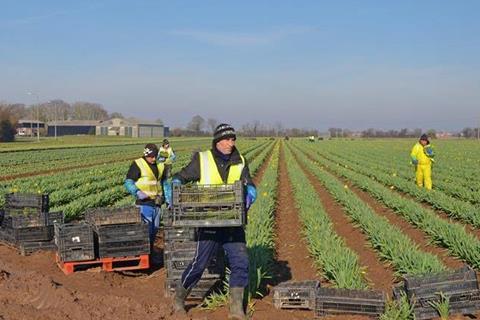Long-term commitment was major industry ask and comes alongside investment in automation
The government has committed to a five-year seasonal worker visa scheme in a major boost for UK growers.

Responding to John Shropshire’s Independent Review into Labour Shortages in the Food Supply Chain, Defra said it will implement a series of new measures to support the industry. The flagship item is the announcement that the seasonal worker visa route will be extended for five years until 2029 to give businesses time to plan effectively.
Some 43,000 visas will be available to the horticulture sector in 2025, with another 2,000 visas for poultry. Further details of the number of visas available for 2026 to 2029 will be set out later this year, Defra said.
The measures include up to £50 million of further funding for new technology to support fully automated packhouses, with more support to follow to bring robotic crop pickers on a par with human pickers in three to five years.
The government also aims to create a comprehensive strategy to enhance skills provision and attract domestic workers.
Environment secretary Steve Barclay said: ”We have a world-class food and drink sector, and the measures announced today will strengthen this by boosting funding for the cutting-edge technology that will reduce reliance on migrant labour in the long term.
“Businesses do best when they can plan effectively for the future, which is why we’ve extended the seasonal worker visa route until 2029 to give farmers and growers the certainty they need to thrive.”
‘Huge relief’
The NFU, which has campaigned over a number of years for a long-term commitment from government on seasonal labour, welcomed the news, saying it provided confidence for businesses and applicants alike.
“This will be a huge relief for the horticulture and poultry sectors that rely on seasonal workers and is a brilliant win for the NFU, which has been campaigning for a long-term plan for seasonal workers for some time,” said NFU president Tom Bradshaw.
“We have seen in the past how damaging shortages of workers has been, with approximately £60m worth of crops lost in 2022 due to a shortfall of workers. We know that with the correct trading conditions there are significant opportunities for growth and the commitment to a five-year scheme is very positive.
“Moving forward, it is vital to have assurance that the number of visas and the costs associated with accessing them will continue to meet the needs of our food producers.”
Investment in automation
The government has put increased emphasis on the use of automation in the horticulture sector to reduce the reliance on migrant workers, and announced new investment in that area alongside measures to promote British workers into agriculture.
The investment will start with immediate work to fully automate a group of major packhouses in 12 to 18 months, which will improve understanding of the government support needed to make fully automated packhouses universally viable.
Defra said that information learned from this will help inform its planned £50m package of packhouse automation funding, with further details to be announced later this year to cover 2024-25 and 2025-26.
The government said it will also work with technology companies to accelerate the development of robotic crop harvesters, with the aim of bringing prototypes on a par with human pickers in three to five years. This will help make the UK food supply chain the most cutting-edge in the world, it added.
Attracting Brits into farm work
In a further development, the government announced it will also work to improve the attractiveness of the sector for domestic workers, delivering regional recruitment strategies to support jobseekers into roles in food and farming, and building greater collaboration between government, industry and education providers.
The strategy includes collaborating with the Food and Drink Sector Council’s Sector Attractiveness Project Group to improve awareness of the diverse range of opportunities and career paths across the UK food chain, providing seed funding to establish the Institute for Agriculture and Horticulture (TIAH), and working with the Department for Work and Pensions to deliver regional recruitment strategies that utilise its Jobcentre Plus network.



